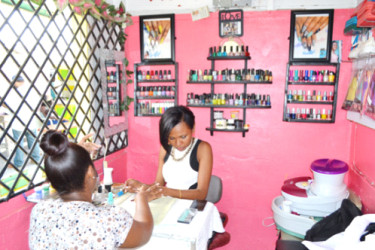What has now become Guyana’s multi-million-dollar beauty industry comprises a range of business enterprises from thriving distribution outlets that market an assortment of accessories associated with the sector, to modest ones that deliver the various cosmetology services, including barbering.
Beauty salons have become, simultaneously, one of the more visible symbols of Guyanese women’s preoccupation with self-adornment and a reflection of their growing appetite for entrepreneurial pursuits. Hair and nails have become an essential part of the preparation for making grand appearances at night clubs, popular concerts and other ‘outings.’ The sector has been buoyed by the phenomenal growth of the weekend entertainment industry and the now frequent ‘invasion’ of Georgetown by international artistes mostly of the ‘Dance Hall’ genre. These, coupled with working women and housewives who are simply focused on looking good, have become rich pickings for the local beauty industry.

In the process, small, bustling enterprises have become an integral part of the industry. It took Onika ‘Nicky’ Lewis six years to get to the stage of owning an establishment. In 2008, she opened her business at 71 Merriman Mall and has since been engaged in what she concedes is the demanding pursuit of working “for myself.”
When she transitioned from being an employee at a hair salon to managing her own enterprise she had had no previous experience in business and she found the exposure intimidating. Perhaps the saving grace reposed in the fact that her mother had owned the stall at Merriman Mall—selling Tupperware and other plastics—and had decided to call it a day. That opened up the opportunity for Lewis to secure a space without having to go looking.
She does not recall what her startup costs were but remembers well that she was running on the proverbial shoestring budget. The table and chair with which she started were built for her by her father. The sink, nail glue, nail polish and other requisites of the trade with which she started could have—as far as she recalls—cost somewhere in the region of $28,000.
Hers is a somewhat familiar story. As a teenager she had become immersed in plaiting friends’ hair and doing their nails. She recalls missing art classes to plait her friends’ hair.
Afterwards she found herself an apprentice at La Belle Hair Salon in Cummings Street. “I liked doing nails. I did my own without any training. I just read and observed,” she said.
Eventually, friends began to take note of what she was doing with her own nails. They wanted theirs done too. She started with house visits even as she worked at a hair salon.
The beauty industry is a ferociously competitive one. It is only the fittest that stay the course. Lewis believes that she has passed that test on account of her rigid focus on good customer service. Reliability, she says, is important. You simply do not let a woman seeking a beauty treatment down.
Customers can be quirky. There have been instances, she says, where persons arrived at her establishment with seemingly clear ideas on colour and design. Sometimes she is compelled to inform them that their choices are incompatible with their skin and the shape of their nails. Some relent, others insist. That is an occupational hazard.
She is happier, more motivated, when she is allowed to put her creativity to work. That happens when customers simply walk in and declare “do your thing!”
These days she sets herself the target of ‘inventing’ at least two new nail designs regularly. It takes about five to ten minutes to put those designs on two fingers, using her hands and without any help from manufactured designs. Afterwards she admires her handiwork.
Lewis insists that her prices are competitive. Nails can last for about six weeks once customers are mindful of caring and repairing them.
A pedicure costs $3,000 as does a manicure. Nail repairs cost $2,000. She takes about 45 minutes to complete a job and may complete as many as 15 jobs in what, invariably, are long days.
Most of her customers are working individuals so that she is forced to keep irregular hours. On the whole, she says, there are periods when she sees a sharp spike in demand though business is steady throughout the year.
Over the years, Lewis has worked alone; not that she has not sought to hire help in the past but that has had it complications.
She concedes that her business skills are not what they ought to be. She is a far from competent accountant and could not say with anything resembling precision what her monthly earnings are. She is not alone. A scarcity of business skills is a limitation that afflicts a great many small service providers and that, frequently, accounts for the fact that their ventures either remain static of simply fade away.
Lewis, for the time being at least, is preoccupied with doing sufficiently well to support her family which includes three children.
At around 7.30 pm two Wednesdays ago, Lewis had three customers.
To succeed in the beauty industry, one must market oneself as aggressively as one markets one’s skills. Customers are attracted to a working environment in which they are comfortable so that the service provider must focus attention of providing that environment. Lewis comes across as warm and sociable. These are skills, she says, which you must cultivate out of necessity. Her line of reasoning is that since beauty salons are places where customers spend many hours you have to create an environment in which they would feel good waiting.
Lewis is uncertain about her future. Her interest in beauty and fashion goes beyond what she is doing at this time. S
he would love to run a boutique but she is not ruling out migration. In the immediate-term, however, she is seeking to find ways of upgrading her establishment. Perhaps she may be in business for the long haul, after all.




